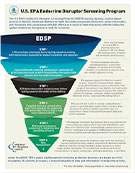September 28, 2015
Endocrine Society disregards state of science around chemical exposures and endocrine system
WASHINGTON (September 28, 2015) – The American Chemistry Council (ACC) issued the following statement challenging the Endocrine Society’s views on Diabetes and Obesity risks associated with endocrine disrupting chemicals.
“The Endocrine Society’s statement, organized and produced by a limited group of Society members, disregards the state of the science associated with the effects of chemicals on the endocrine system and makes broad, unsupported claims about the relationship between certain chemicals and disease. The statement incorrectly characterizes as settled, the still-unproven hypothesis regarding risks of low levels of exposure to particular chemicals. In doing so, the Society discounts the extensive reviews by experts at the U.S. Environmental Protection Agency and the European Food Safety Authority that were unable to substantiate the health significance of the so called low-dose effects, and questioned the validity of the non-monotonic hypothesis. Furthermore, the Endocrine Society’s report fails to differentiate between chemicals that are ‘endocrine-active,’ meaning they interact with the endocrine system, and those that are ‘endocrine disruptors,’ meaning that the levels of exposure associated with that interaction cause scientifically-proven adverse health effects.
“The global chemicals industry is supporting continued research to advance the scientific understanding of the way chemicals interact with the endocrine system using validated screening tools, tests and methods. The industry’s Long Range Research Initiative has developed cutting edge screens and tests to support these efforts and has made substantial contributions to the development of High Throughput tools that can be used to prioritize and screen chemicals at a much faster pace than traditional methods. Industry has been an active participant in the U.S. EPA program and has submitted data and analysis on test-method development and chemicals for use by regulators to determine whether chemicals activate the endocrine system and if so, whether they cause adverse health effects due to that interaction.
“To promote sound scientific study and evidence-based decision making, the International Council of Chemical Associations (ICCA), of which ACC is a member, has released 11 Principles for Identifying Endocrine-Active and Endocrine-Disrupting Chemicals. This set of recommendations will promote transparency, consistency, and reliability in programs that explore the relationship between chemicals, the endocrine system and potential health consequences. We encourage the Endocrine Society, and others engaged in work of this nature, to adopt and adhere to these common-sense principles when pursuing future research.”



